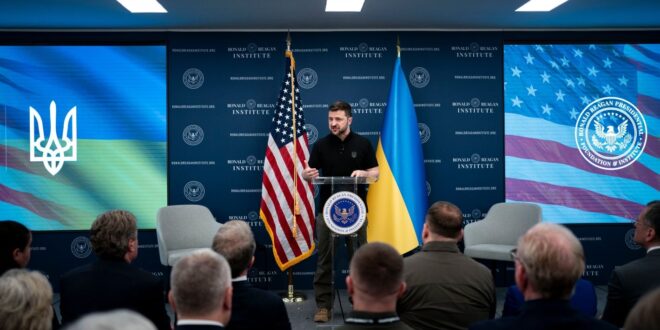Despite lofty declarations of support, Ukraine’s main backers are increasingly focused on laying the groundwork for Kyiv’s negotiations with Moscow. Instead of ensuring sustainable security in Europe, the compromises under discussion would embolden Russia and China.
A sobering diplomatic reality increasingly lurks behind the West’s lofty statements of support for Ukraine.
“Germany stands firmly by Ukraine’s side,” Foreign Minister Annalena Baerbock said during a visit to Kyiv on Monday. “We will support the Ukrainians for as long as they need us so that they can continue on their path to a just peace.”
What Ukraine has needed since February 2022, however, isn’t support “as long as it takes” but rather support to win as fast as possible. That has become even more true now that European nations are facing budgetary and political pressures that make open-ended support increasingly unsustainable.
In an article last week, U.S. Secretary of Defense Lloyd Austin reiterated the lofty statements about the importance of Ukraine’s fight that have become proforma since Russia’s invasion. Most revealing was what Austin omitted. He and other U.S. leaders remain silent on allowing Ukraine to strike the military installations on Russian soil from which the country launches attacks—a military tactical aberration.
Nor did Austin remark on Ukraine’s demand for NATO membership. There wasn’t even a mention of a resolute action to counter the deployment of 10,000 North Korean troops in Russia, close to the border with Ukraine.
Austin wrote: “There is no silver bullet. No single capability will turn the tide. No one system will end Putin’s assault. What matters is the combined effects of Ukraine’s military capabilities—and staying focused on what works.”
The problem is that what the United States and Europeans have done since February 2022 hasn’t worked enough. Certainly not if the objective is to end Russia’s invasion and occupation of Ukrainian territory and to deter future Russian aggression.
What top serving American and European officials are also not saying publicly is that there is a growing, quiet consensus that negotiations, which will entail accepting at least a temporary loss of sovereignty over territories, are the only way to end this war.
Russian forces are advancing steadily in Donbas and Ukraine is struggling to reinforce its depleted troops. Western officials also won’t admit that they can no longer provide Kyiv with the kind of military support they have provided so far, either because the required political consensus has dissipated or because of budgetary constraints and depleted stocks.
These headwinds continue to block Ukraine’s path to NATO membership. Apart from a handful, even the most forward-leaning allies talk euphemistically about “building a bridge” for Ukraine to join NATO. This wouldn’t be the first bridge to nowhere in global politics.
Regardless of who wins the U.S. presidential election, there is scant support in Washington for Ukraine to join NATO or for providing it with the capabilities that would allow Kyiv to turn the tide against Russia. The chances of U.S. President Joe Biden crossing that Rubicon during his lame duck period remain low—though notably are not null.
What was strategically sound at the beginning of Russia’s invasion—to try to manage the escalation with a nuclear power—has turned into strategical cowering, encouraging Russian escalation not just in Ukraine with rogue allies, Iran and North Korea, but with subversive operations against European countries as well.
For several months, quiet diplomatic contacts between Russia and Ukraine have increased, directly and indirectly. These have led to prisoner swaps and discussions of protecting what little remains of Ukraine’s energy infrastructure. They are also increasingly considering the contours of a potential negotiated settlement to the war.
A resolution remains elusive. Russia’s demands remain maximalist—effectively Ukraine totally surrendering its sovereignty in all but name. Kyiv is at one of its weakest points since February 2022, and the prospect of selling such a negotiation is a political minefield for Ukrainian President Volodymyr Zelensky. It is also going to require savvy public messaging from European leaders who have spent more than two years telling their constituents that this was an existential fight not only for Ukraine but for Europe’s security—meriting billions in assistance to Kyiv.
A plethora of models are on the table providing blueprints for negotiation starting points.
Diplomats are trying to come up with a winning formula from the smorgasbord of the Ukraine Peace Plan, the Chinese-Brazilian plan, and the Russian-Ukrainian negotiations in Turkey in March 2022.
The East-West Germany model has had remarkable staying power, the Korea model has cyclical moments, while the Finland model was all the rage at the start of the invasion and is now making a comeback among some.
Even if Ukraine were willing to set aside its fundamental right to restore its territorial integrity, and preserve its sovereignty and self-determination, this would not durably resolve the core strategic challenge to European security posed by Russia. If anything, it could eventually encourage Russia to attack one of the border NATO countries at a moment when the United States is focused on China.
French President Emmanuel Macron is the only Western leader who has so far publicly suggested components of supercharged security guarantees for Ukraine that could mitigate European security concerns, if not entirely resolve them. The reactions to his suggestion, made in February 2024, of deploying European troops to Ukraine and hardening its air defenses and deep-strike capabilities, all for defensive purposes, revealed the enduring gap between Europeans’ statements and what they’re willing to put on the line for a fight they present as existential. Paris has not given up on the idea, and has increasing support from the UK, Eastern European, and Nordic countries.
Any surrender of Ukrainian territory would allow Vladimir Putin to claim victory in redrawing Europe’s borders by force, and subjugating a sovereign UN member state—a precedent with grave implications, including for the South China Sea.
It is on these issues that part of Macron and Biden’s legacies will be determined.
 Eurasia Press & News
Eurasia Press & News


